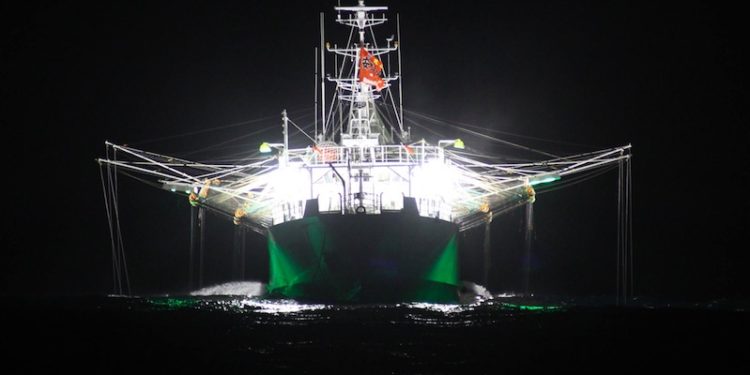The success story that the Falkland Islands’ fishing industry has become since the mid-1980s is now threatened by the prospect of crippling tariffs on its exports once the UK has left the European Union.
‘Prior to the 1980s, the Falklands were in decline. Since then, with the exception of defence, the islands have become self-reliant – and that is because of the success story that is the fishing industry,’ said Falklands Islands Government senior policy adviser Richard Hyslop.
He said that fishing has become crucial to the Falklands economy, with two-thirds corporation tax receipts coming from fishing and the industry accounting for 40% of GDP.
‘These are small numbers compared to the UK economy, but for a community with a small population like the Falklands, this is of huge importance,’ he said.
‘It’s a central part of the economy, as well as being at the heart of the community. Schools and hospitals are there because of the successful fishing industry,’ he said and commented that the Brexit effect is already being felt as some businesses have mothballed projects and investments due to the current political uncertainty.
Loligo squid is one of the key products species in Falklands waters, and the islands have close links with the Spanish port of Vigo, not least as this is the gateway through which 94% of Falklands exports pass on their way to markets around the world. Under a no deal or a poor deal scenario, tariffs of between 6 and 18% could be applied to loligo squid and other products.
‘This is the most expensive squid of the market and we could find ourselves in a situation with a tariff applied as exports enter the EU, and then a second tariff as they are exported to other markets,’ he said, commenting that the double tariff could either lift the price of the squid to the point that buyers look for alternatives, or fishing companies would have to absorb the tariffs themselves – with significant implications for their profitability.
‘The ability of the UK government to negotiate access to EU markets, tariff- and quota-free, for the Falkland Islands, is of paramount importance,’ he said, adding that at present there is an ongoing state of uncertainty and while the UK government has given its assurances to the Falklands Islands Government, and recognises that of all the overseas territories, the Falkland Islands are expected to be the most severely affected by Brexit.
‘It’s already June, and this is all supposed to be wrapped up by October,’ he said, commenting that there is an acute awareness of the urgency of the situation.
‘The UK government has acknowledged the situation but we have not yet seen or heard anything concrete,’ he said.
Galicia also has good reason to be nervous, as 6000 jobs there are reliant on Falklands fisheries and the products exported to Spain where much of the value is subsequently added before these are shipped to their final destinations.
‘Most of our fishing is under joint ventures with Spanish companies, and the Falkland Islands have been able to build up a very successful and sophisticated relationship with a major European economy,’ Richard Hyslop said.
‘We are hoping that the UK government will negotiate a good deal on our behalf that will give our fishing industry quota- and tariff-free access to the single market. The Falkland Islands don’t want to see the industry suffer after it has made so much progress.’









